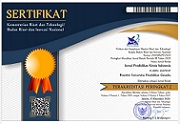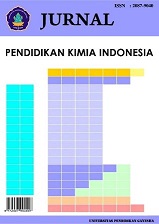Implementation of the STEM-PBL Approach in Online Chemistry Learning and its Impact on Students' Critical Thinking Skills
DOI:
https://doi.org/10.23887/jpki.v6i2.44317Keywords:
Critical thinking, PBL, Online learning, STEMAbstract
Chemistry is a very important branch of science because it deals with phenomena that often occur in everyday life. In chemistry learning, students are invited to study the material and its changes. Chemistry learning is considered very abstract because it cannot be seen directly by the naked eye. It causes most high school students to think that chemistry is difficult—limitations of learning during the Covid-19 pandemic affected various abilities possessed by students. Students lack critical thinking skills, namely, the inability to analyze and provide solutions to simple problems. The purpose of this research is to develop students' critical thinking skills through the application of the STEM-PBL approach to online learning. This research uses a qualitative descriptive method with observation sheet instruments and test questions. STEM integrated into PBL is one of the solutions to improve students' critical thinking skills. The results of the application of STEM-PBL show an increase in students' critical thinking skills in solving everyday problems. Students can also design tools to solve problems and integrate various disciplines.
References
Agustina, A. (2017). Pembelajaran Konsep Ikatan Kimia Dengan Animasi Terintegrasi Lcd Projector Layar Sentuh (Low Cost Multi Touch White Board). JTK (Jurnal Tadris Kimiya), 1(1), 8–13. https://doi.org/10.15575/jta.v1i1.1163. DOI: https://doi.org/10.15575/jta.v1i1.1163
Agustina, R., Huda, I., & Nurmaliah, C. (2020). Implementasi Pembelajaran STEM pada Materi Sistem Reproduksi Tumbuhan dan Hewan Terhadap Kemampuan Berpikir Ilmiah Peserta Didik SMP. Jurnal Pendidikan Sains Indonesia, 8(2), 241–256. https://doi.org/10.24815/jpsi.v8i2.16913. DOI: https://doi.org/10.24815/jpsi.v8i2.16913
Ardianti, S., Sulisworo, D., Pramudya, Y., & Raharjo, W. (2020). The impact of the use of STEM education approach on blended learning to improve student’s critical thinking skills. Universal Journal of Educational Research, 8(3 B), 24–32. https://doi.org/10.13189/ujer.2020.081503. DOI: https://doi.org/10.13189/ujer.2020.081503
Arifin, N. (2020). Efektivitas Pembelajaran Stem Problem Based Learning Ditinjau Dari Daya Juang Dan Kemampuan Pemecahan Masalah Matematis Mahasiswa Pgsd. Jurnal Pendidikan Matematika Indonesia, 5(1). https://doi.org/10.26737/jpmi.v5i1.1644. DOI: https://doi.org/10.26737/jpmi.v5i1.1644
Davidi, E. I. N., Sennen, E., & Supardi, K. (2021). Integrasi Pendekatan STEM (Science, Technology, Enggeenering and Mathematic) Untuk Peningkatan Keterampilan Berpikir Kritis Siswa Sekolah Dasar. Scholaria: Jurnal Pendidikan Dan Kebudayaan, 11(1), 11–22. https://doi.org/10.24246/j.js.2021.v11.i1.p11-22. DOI: https://doi.org/10.24246/j.js.2021.v11.i1.p11-22
Debora, R., & Pramono, R. (2021). Implementation of STEM Learning Method to Develop Children’s Critical Thinking and Problem Solving Skills. Jurnal Obsesi : Jurnal Pendidikan Anak Usia Dini, 6(3), 1221–1232. https://doi.org/10.31004/obsesi.v6i3.1722. DOI: https://doi.org/10.31004/obsesi.v6i3.1722
Dian Primasari, I. F. N., & Zulela, Z. (2021). Kendala Pembelajaran Jarak Jauh (PJJ) Secara Online Selama Masa Pandemik Covid-19 di Sekolah Dasar. JIKAP PGSD: Jurnal Ilmiah Ilmu Kependidikan, 5(1), 64. https://doi.org/10.26858/jkp.v5i1.16820. DOI: https://doi.org/10.26858/jkp.v5i1.16820
Effendi, R., Herpratiwi, H., & Sutiarso, S. (2021). Pengembangan LKPD Matematika Berbasis Problem Based Learning di Sekolah Dasar. Jurnal Basicedu, 5(2), 920–929. https://doi.org/10.31004/basicedu.v5i2.846. DOI: https://doi.org/10.31004/basicedu.v5i2.846
Fadlina, Artika, W., Khairil, K., Nurmaliah, C., & Abdullah, A. (2021). Penerapan Model Discovery Learning Berbasis STEM pada Materi Sistem Gerak Untuk Meningkatkan Keterampilan Berpikir Kritis. Jurnal Pendidikan Sains Indonesia, 9(1), 99–107. https://doi.org/10.24815/jpsi.v9i1.18591. DOI: https://doi.org/10.24815/jpsi.v9i1.18591
Farwati, R., Permanasari, A., Firman, H., & Suhery, T. (2017). Integrasi problem based learning dalam STEM education berorientasi pada aktualisasi literasi lingkungan dan kreativitas. Prosiding Seminar Nasional Pendidikan IPA, 198–206.
Fauzan, M., Gani, A., & Syukri, M. (2017). Penerapan Model Problem Based Learning Pada Pembelajaran Materi Sistem Tata Surya Untuk Meningkatkan Hasil Belajar Siswa. Jurnal Pendidikan Sains Indonesia (Indonesian Journal of Science Education), 5(1), 27–35.
Fithri, S., Tenri Pada*, A. U., Artika, W., Nurmaliah, C., & Hasanuddin, H. (2021). Implementasi LKPD Berbasis STEM untuk Meningkatkan Keterampilan Berpikir Kritis Peserta Didik. Jurnal Pendidikan Sains Indonesia, 9(4), 555–564. https://doi.org/10.24815/jpsi.v9i4.20816. DOI: https://doi.org/10.24815/jpsi.v9i4.20816
Hacioglu, Y., & Gulhan, F. (2021). The Effects of STEM Education on the Stud ents ’ Critical Thinking Skills a nd To cite this article : The Effects of STEM Education on the Stud ents ’ Critical Thinking Skills and STEM Perceptions. Journal of Education in Science, Environment and Health, 7(2), 139–155. DOI: https://doi.org/10.21891/jeseh.771331
Harianto, A., Suryati, S., & Khery, Y. (2019). Pengembangan Media Pembelajaran Kimia Berbasis Android Untuk Penumbuhan Literasi Sains Siswa Pada Materi Reaksi Redoks Dan Elektrokimia. Hydrogen: Jurnal Kependidikan Kimia, 5(2), 35. https://doi.org/10.33394/hjkk.v5i2.1588. DOI: https://doi.org/10.33394/hjkk.v5i2.1588
Hasanah, Z., Tenri Pada, A. U., Safrida, S., Artika, W., & Mudatsir, M. (2021). Implementasi Model Problem Based Learning Dipadu LKPD Berbasis STEM untuk Meningkatkan Keterampilan Berpikir Kritis pada Materi Pencemaran Lingkungan. Jurnal Pendidikan Sains Indonesia, 9(1), 65–75. https://doi.org/10.24815/jpsi.v9i1.18134. DOI: https://doi.org/10.24815/jpsi.v9i1.18134
Hernanda, A., Kumalasani, M. P., & Danawati, M. G. (2021). Analisis Problematika Pembelajaran Online SDN 1 Kalirejo Kabupaten Malang Dalam Masa Pandemi Covid-19. JIKAP PGSD: Jurnal Ilmiah Ilmu Kependidikan, 5(2), 237. https://doi.org/10.26858/jkp.v5i2.19539. DOI: https://doi.org/10.26858/jkp.v5i2.19539
Isatunada, A., & Haryani, S. (2021). Development of Science Learning Tools using the STEM Approach to Train Problem Solving Ability and Students Activeness in Global Warming Material. Jurnal Pendidikan Sains Indonesia, 9(3), 363–375. https://doi.org/10.24815/jpsi.v9i3.19599. DOI: https://doi.org/10.24815/jpsi.v9i3.19599
Jayadiningrat, M. G., & Ati, E. K. (2018). Peningkatan Keterampilan Memecahkan Masalah Melalui Model Pembelajaran Problem Based Learning (Pbl) Pada Mata Pelajaran Kimia. Jurnal Pendidikan Kimia Indonesia, 2(1), 1. https://doi.org/10.23887/jpk.v2i1.14133. DOI: https://doi.org/10.23887/jpk.v2i1.14133
Kurniati, D., Khairil, K., & Darwin, C. (2019). Kemampuan Berpikir Kritis Siswa pada Pembelajaran PBL dengan Media Audio Visual di SMP Negeri 6 Bengkulu Tengah. Seminar Nasional Sains …, (2014), 1–7.
Lutfi, A., Aini, N. Q., Amalia, N., Umah, P. A., & Rukmana, M. D. (2021). Gamifikasi Untuk Pendidikan: Pembelajaran Kimia Yang Menyenangkan Pada Masa Pandemic Covid-19. Jurnal Pendidikan Kimia Indonesia, 5(2), 94. https://doi.org/10.23887/jpk.v5i2.38486. DOI: https://doi.org/10.23887/jpk.v5i2.38486
Muharni, A., & Mustami, M. K. (2019). Analisis Tingkat Kemampuan Berpikir Kritis pada Mata Pelajaran Biologi di SMA. Seminar Nasional Biologi, (2011), 136–140.
Nadeak, B., Juwita, C. P., Sormin, E., & Naibaho, L. (2020). Hubungan kemampuan berpikir kritis mahasiswa dengan penggunaan media sosial terhadap capaian pembelajaran pada masa pandemi Covid-19. Jurnal Konseling Dan Pendidikan, 8(2), 98–104. https://doi.org/10.29210/146600. DOI: https://doi.org/10.29210/146600
Oktaviani, A., Anom, K., & Lesmini, dan B. (2020). Pengembangan Modul Kimia t erintegrasi STEM ( Science, Technology, Engineeri ng and Mathematics ) dan PBL ( Problem - Based Learning ). Journal of Educational Chemistry, 2(2), 64–72. https://doi.org/10.21580/jec.2020.2. 2 . 6 279. DOI: https://doi.org/10.21580/jec.2020.2.2.6279
Parno, Supriana, E., Yuliati, L., Widarti, A. N., Ali, M., & Azizah, U. (2019). The influence of STEM-based 7E learning cycle on students critical and creative thinking skills in physics. International Journal of Recent Technology and Engineering, 8(2 Special Issue 9), 761–769. https://doi.org/10.35940/ijrte.B1158.0982S919. DOI: https://doi.org/10.35940/ijrte.B1158.0982S919
Purwanto, A., Pramono, R., Asbari, M., Santoso, P. B., Wijayanti, L. M., Choi, C. H., & Putri, R. S. (2020). Studi Eksploratif Dampak Pandemi COVID-19 Terhadap Proses Pembelajaran Online di Sekolah Dasar. EduPsyCouns: Journal of Education, Psychology and Counseling, 2(1), 1–12. Retrieved from https://ummaspul.e-journal.id/Edupsycouns/article/view/397.
Putri, C. D., Pursitasari, I. D., & Rubini, B. (2020). Problem Based Learning Terintegrasi STEM Di Era Pandemi Covid-19 Untuk Meningkatkan Keterampilan Berpikir Kritis Siswa. Jurnal IPA & Pembelajaran IPA, 4(2), 193–204. https://doi.org/10.24815/jipi.v4i2.17859. DOI: https://doi.org/10.24815/jipi.v4i2.17859
Santoso, S. H., & Mosik, M. (2019). Kefektifan LKS Berbasis STEM (Science, Technology, Engineering and Mathematic) untuk Melatih Keterampilan Berpikir Kritis Siswa pada Pembelajaran Fisika SMA. Unnes Physics Education Journal, 8(3), 248–253. https://doi.org/10.15294/upej.v8i3.35622.
Sari, S. I., Suhery, T., & Effendi. (2020). Pengembangan Bahan Ajar Kimia Dasar Berbasis STEM Problem Based Learning Pada Materi Termodinamika. Jurnal Penelitian Pendidikan Kimia, 7(2), 980–990.
Satwika, Y. W., Laksmiwati, H., & Khoirunnisa, R. N. (2018). Penerapan Model Problem Based Learning untuk Meningkatkan Kemampuan Berfikir Kritis Mahasiswa. Jurnal Pendidikan (Teori Dan Praktik), 3(1), 7. https://doi.org/10.26740/jp.v3n1.p7-12. DOI: https://doi.org/10.26740/jp.v3n1.p7-12
Setia Permana, I. P. Y., Nyeneng, I. D. P., & Distrik, I. W. (2021). The Effect of Science, Technology, Engineering, and Mathematics (STEM) Approaches on Critical Thinking Skills Using PBL Learning Models. Berkala Ilmiah Pendidikan Fisika, 9(1), 1. https://doi.org/10.20527/bipf.v9i1.9319. DOI: https://doi.org/10.20527/bipf.v9i1.9319
Sholichin, M., Zulyusri, Z., Lufri, L., & Razak, A. (2020). Analisis Kendala Pembelajaran Online Selama Pandemi Covid-19 Pada Mata Pelajaran IPA di SMPN 1 Bayung Lencir. Biodik, 7(2), 163–168. https://doi.org/10.22437/bio.v7i2.12926. DOI: https://doi.org/10.22437/bio.v7i2.12926
Suryaningsih, A., & Koeswanti, H. D. (2021). Perbedaan Model Pembelajaran Problem Based Learning dan Project Based Learning Terhadap Peningkatan Kemampuan Berfikir Kritis IPA Siswa SD. Mimbar PGSD Undikhsa, 9(1), 40–48. https://doi.org/10.23887/jjpgsd.v9i1.33196. DOI: https://doi.org/10.23887/jjpgsd.v9i1.33196
Utami, M. T., Koeswati, H. D., & Giarti, S. (2019). Model Problem Based Learning ( PBL ) Berbantuan Media audio Visual Untuk Meningkatkan Keteramoilan Berpikir Kritis Pada Siswa Kelas 5 Sekolah Dasar. Maju, 6(1), 80–91. Retrieved from https://ejournal.stkipbbm.ac.id/index.php/mtk/article/view/309.
Zakiyah, Ibnu, S., & Subandi. (2018). Analisis Dampak Kesulitan Siswa pada Materi Stoikiometri Terhadap Hasil Belajar Termokimia. EduChemia (Jurnal Kimia Dan Pendidikan), 3(1), 119–134. DOI: https://doi.org/10.30870/educhemia.v3i1.1784
Downloads
Published
How to Cite
Issue
Section
License
Copyright (c) 2022 Jurnal Pendidikan Kimia Indonesia

This work is licensed under a Creative Commons Attribution-ShareAlike 4.0 International License.
Authors who publish with the Jurnal Pendidikan Kimia Indonesia agree to the following terms:
- Authors retain copyright and grant the journal the right of first publication with the work simultaneously licensed under a Creative Commons Attribution License (CC BY-SA 4.0) that allows others to share the work with an acknowledgment of the work's authorship and initial publication in this journal.
- Authors are able to enter into separate, additional contractual arrangements for the non-exclusive distribution of the journal's published version of the work (e.g., post it to an institutional repository or publish it in a book), with an acknowledgment of its initial publication in this journal.
- Authors are permitted and encouraged to post their work online (e.g., in institutional repositories or on their website) prior to and during the submission process, as it can lead to productive exchanges, as well as earlier and greater citation of published work. (See The Effect of Open Access)





